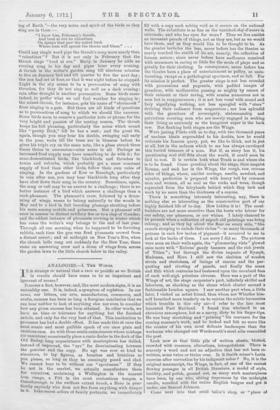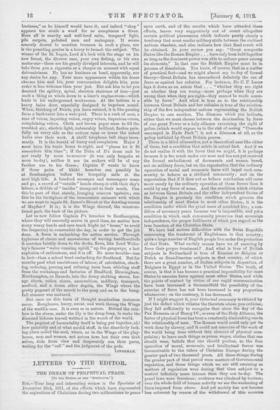ANALOGIES.—I. Tan WINGS.
IS it strange or natural that a race so prolific as we British in results should have come to be so impatient and ignorant of means P
It seems a fact, however, and, like most modern signs, it is an unhealthy one. It is, indeed, a symptom of repletion. In our arms, our letters, our arts, manufactures, commerce, and crafts, success has been so long a, foregone conclusion that we can bear neither to look at anything else nor even to consider how any given success has been attained. In other words, we have no time or tolerance for anything but the finished article, and only for the very best of that. This inattention to processes has had a double effect. It has made this at once the most scenic and most gullible epoch of our once plain and cautious race. As with those senile connoisseurs whose mishaps (or executors) occasionally place a curio dealer in the dock of the Old Bailey, long acquaintance with masterpieces has dulled, instead of improved, the "eye" for discriminating between the genuine and the copy. No age was ever so kind to simulacra, to lay figures, as boneless and brainless as you please, so long as they be cunningly posed and clad. We cannot bear to be without our " specimens." If they be not in the market, we actually manufacture them for ourselves, acclaiming a Wellington in • the nearest iron visage, a Pitt in the most sententious tongue, a Gainsborough in the swiftest extant brush, a Hero in prac- tically anybody who does not flee from anything with danger in it. Like secret sellers of family portraits, we immediately
fill with a copy each aching void as it occurs on the national walls, The substitute is as fine as the vanished chief-d'oeuvre in externals; and who has eyes for more P Thus we live amidst an incessant parade of things, not as they are, but as we would have them, and as they would like to be thought to be. As the greater includes the less, never before has the theatre so nearly touched the zenith of its art, namely, the reflection of human nature ; since never before have audiences connived with mummers in caring so little for the souls of plays and so greatly for their clothing. In consequence, never before has the theatre been a place of entertainment so paltry, so unin- teresting, except as a, pathological specimen, and so full. For its mission is perfect. The greater stage is not less crowded with processions and pageants, with padded images of grandeur, with mediocrities passing as mighty by reason of their raiment or their raving, with armies numerous not in men but in reappearances ; it is not less vocal with sound and fury signifying nothing, not less spangled with "stars" deriving their radiance from magnesium ; nor less splendid with the garniture of sovereignty, statesmanship and patriotism covering men who are merely engaged in seeking their living as anxiously as the hungriest super in the bank row. But flanking both stages are the Wings.
Were jesting Pilate with us to-day, with two thousand years of unclean ideals superadded to his doubts, bow he would reiterate his famous query, put, we like to think, not in jest at'all, but in the sadness which to me has always enveloped this buried treasure of a man. But if, as story has it, his questioning soul still flits about the world, it could soon be laid to rest. It is certain both what Truth is and where she is to be found. Cease questing about the stage, thou unquiet Roman, and seek her in the Wings, the rough, raw, reverse sides of things, where, amidst cordage, smells, sawdust, and squalor, perfection is prepared with heavy toil by common men and women, all as real as the rocks and trees, though separated from the fairylands behind which they lurk and work by no more than the thickness of a canvas.
There is something intensely interesting, nay, there is nothing else so interesting as the constructive part of our highly finished life of to-day. How hidden it is I The coral- builders are not more secretive than the hosts who labour for our safety, our pleasures, or our whims. I lately chanced to be present when a collection of superb old paintings was being rehung ; and as they lay about the floor on every side, "like camels stooping to unlade their riches "—so many thousands of guineas in each few inches of pigment—it occurred to me to look at the backs of them. I am sorry I did so. The pictures were soon on their walls again, the "glimmering vista" glowed once more with " Rubens' gaudy banners and the rich jewels of Titian" ; but through the divine impasto of Nymph, Madonna, and Hero I still saw the skeleton of wooden struts and stretchers, of linings of canvas and the par- queting and riveting of panels, and finally the scars and filth which centuries had bestowed upon the unvalued face of each well-nigh priceless obverse. Here was a part of the Wings of art, the stage carpenter's part, infinitely skilful and laborious, as shocking as the slums which cluster around a fashionable London square. I saw another part when, a little later, I visited an artist friend, than whom not Whistler him. self breathed more tenderly on to canvas the subtle harmonies which tremble in We city air—I refer to the late most lamented Paul Maitland. I found him whelmed in an atrocious atmosphere, hot as a navvy, dirty to his finger-tips. He was busy stretching and " priming " his canvases for the coming summer's work, and he looked and felt no more like the creator of his own most delicate landscapes than the workman who stamped out Wordsworth's steel nibs resembled the poet.
Look now at that little pile of written sheets, blotted, crowded with erasures, alterations, interpolations. There is scarcely a word and not an adjective that has not been re. written, some twice or thrice over. Is it Smith minor's Latin
exercise after correction by his indignant usher P No, it is the original manuscript, the Wings, in fact, of one of the easiest
flowing passages in all British literature, a model of style, lucidity, and polish, ground out, as many such masterpieces have been, by one who, sitting impransus by the midnight candle, wrestled with the entire English tongue and got it under, one Samuel Johnson.
Come next into that swell tailor's shop, or " place of
business," as he himself would have it; and indeed " shop " appears too crude a word for so sumptuous a divan. Here all is suavity and well-bred calm, tempered light, pile carpets, polished men and mahogany. It seems scarcely decent to mention trousers in such a place, nor is the presiding genius in a hurry to broach the subject. The winner of the St. Leger, Lord A's luck with the stags on his new forest, the divorce case, your own fishing, or his own motor-ear—these are his gently divulged interests, and be will take from you a cigarette or a cheque on account with equal debonairiness. He has no business on hand, apparently, nor any desire for any. Your mere appearance within his doors charms him and his, your conversation delights him, your order is less welcome than your jest. But ask him to let you descend the spidery, spiral, skeleton staircase of iron—just such a thing as winds down to a liner's engine-room—which leads to his underground workrooms. At the bottom is a heavy baize door, especially designed to imprison sound. When, thinking of Dante, you have entered, it is like passing from a backwater into a weir-pool. There is a rush of men, a roar of voices, inquiring voices, angry voices, imperious voices, complaining voices. Cloth and brown paper seem to fill the troubled air; electric light, unbearably brilliant, flashes pain- fully on every side as the cutters raise or lower the naked bulbs over their work. A shrill telephone bell rings inces- santly. It is the herald of hurry and complaints. Major J must have his tunic home to-night, and "please let it fit somewhere this time "; if the Duke of B's dress suit be not ready by noon to-morrow (it was only bespoke at noon to-day), neither it nor its makers will be of any further use to his Grace ; Captain P wants to know if three pairs of khaki breeches can possibly be at Southampton before the troopship sails at the next high tide. A hundred messages and messengers come and go; a crowd of "outside" bands stump in with their day's labour, a dribble of " insides " stamp out to their meals. Can this be part of that stately, lounging concern upstairs ; can this be the birthplace of the immaculate raiment with which we are wont to regale St. James's Street or the drawing-rooms of Mayfair? It is ; it is the Wings thereof, the construc- tional part, the back of the picture.
Let us now follow Captain P's breeches to Southampton, where they will assuredly arrive in good time, no matter how many weary hands and eyes teach Night (at "home," to avoid the Inspector) to counterfeit the day, in order to get the job done. A force is embarking for active service. Through typhoons of cheers and snowstorms of waving handkerchiefs it marches briskly down to the docks, flows, like Lord Wolse- ley's famous "water running uphill," up the gangways, a last explosion of enthusiasm, and it is off. No more trouble—less in fact—than a school treat embarking for Southend. But for months past what maelstroms of labour, of calculation, check- ing, ordering, passing and refusing have been whirling stuff from the workshops and factories of Bradford, Birmingham, Northampton, or Rounds, into the Army clothing stores, for- age stores, ration stores, ammunition, saddlery, transport, medical, and a dozen other depots, the Wings where the pretty pageant of the march to the quay and on to the bung- full steamer was matured.
But once on this train of thought numberless instances occur. Roughness, hurry, sweat, and work throng the Wings of the world's ease. It is even so in nature. Behind the rain- bow is the storm, under the lily is the dung-heap, to make the diamond hideous travail writhed in the womb of the world.
The pageant of Immortality itself is being put together, ah! bow painfully and of what sordid stuff, in the disorderly lurk- ing place called the soul, where, as in the Wings of the play- house, men and women, not actors here but their own drab selves, hide from view and desperately con their parts, waiting for the "call" and the judgment of the gods.
LINESMAN.



















































 Previous page
Previous page